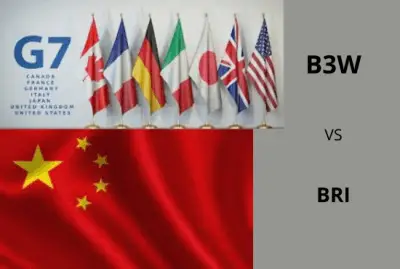Note: The topic “Pros and Cons of Globalization” came in the CSS Essay Paper – 2021. The admin attempted the following essay and cleared this exam.
Please be clear that we have broken the paragraphs for clarity. However, this is not recommended in essay writing. You have to follow the proper structure of essay writing.
Globalization is defined as the free flow and movement of people, ideas, information, and goods across borders.
It was in the second half of the twentieth century that the world witnessed a conspicuous shift from Nationalism and Mercantilism to Globalization and International Liberal Economic Order.
The main motive behind free trade and globalization was mutual interests and gains. Countries opened up their borders. Ultimately, it marked the beginning of a new era defined by the free movement of goods and people across the border.
Primarily, it was the end of World War II that marked the setting up of global institutions like the United Nations, the International Court of Justice, the World Trade Organization (erstwhile General Agreement on Tariffs and Trade), etc.
It was believed that these institutions will help in maintaining peace in the world and avoid another major global war or conflict.
In short, from the latter half of the 20th century till the present, the world remained largely globalized.
Since we have witnessed the entire period of globalization, we can fairly analyze the pros and cons of globalization from hindsight.
So, is globalization good? Does it provide a win-win situation for every country? Are there some drawbacks or cons of globalization too? Let’s dig into details to find answers.
5 Major Pros of Globalization
Globalization offers multiple advantages acknowledged by everyone and denied by none. Following are a few major pros of globalization.
1. Globalization offers Mutual Cooperation & Development
In the past, when the world was non-globalized and nationalism was prevailing, there was a lack of cooperation between states. Even, countries were suspicious of each other. The focus was on self-development and progress. States never cooperated with each other for mutual progress and development.
With the advent of globalization, today’s states are cooperating with each other in the field of education, science, and technology. Moreover, states are working on the basis of mutual intelligence sharing for enhanced security.
For instance, in the recent pandemic crisis, how China has sent medical supplies and teams across borders and oceans clearly highlights the essence of globalization. Those states that were missing ventilators, vaccines, etc got help from other states in fighting Covid-19.
This is an example from recent times. For other example, the spread of Information and Communication Technology across the world is also a hallmark of globalization.
There are multiple regional-level and global-level organizations active today. For example, SAARC, ASEAN, SCO, UNO, WTO, etc all work for the mutual interests of the member countries.
Hence, mutual cooperation and the development of countries are among the most prominent advantages of globalization.
2. Globalization offers more Peace in the World
It is no denying the fact that globalization has brought peace to the world. Though we do witness wars and conflicts even today, those are not on such large scales as in the pre-globalized world.
The pre-globalized world had witnessed two great wars in the 20th century and many even before that. While the states were not interconnected, they remained suspicious of each other’s strengths, motives, and activities. They lacked mutual interests and goals.
Today, the role played by global institutions in the maintenance of world peace is commendable.
Moreover, in today’s globalized world, states are working on common interests and are dependent on each other. With mutual dependency, they are pursuing common economic interests in the form of trade. With each other’s help, states are advancing in science and technology.
Such interdependency has altogether dismissed the chances of any major global conflict in the future.
Moreover, globalization has enhanced people-to-people contact. When people from different cultural backgrounds meet each other and learn about other cultures, it creates a feeling of harmony and goodwill among them. This ultimately promotes peace among nations.
3. More Employment Opportunities for Individuals in a Globalized World
In today’s globalized world, there are multiple employment opportunities for individuals. To explain this fact, we see that multiple multinational companies are working with their branches installed across borders. These companies employ manpower from third-world countries. Thus, those who couldn’t find jobs in local companies or in other public sectors get better employment opportunities.
Moreover, today people also find opportunities to find lucrative jobs across borders. For instance, the report says that 2.7 million Pakistani expatriates are living in Saudi Arabia and working there. It is entirely due to the globalized world that these Pakistani got a chance to better living.
Moreover, educated people also find better opportunities for better employment across borders.
Thus, with enhanced employment opportunities, globalization can actually lift people out of poverty.
4. Market Competition keeps the Prices Down
Another major benefit of globalization and free trade is that the prices of commodities remain down.
As globalization has eradicated monopolies with multiple multinational companies competing for markets, these companies try to keep their product prices down to beat the competitors.
Ultimately, it benefits the locals residing in the country who can access the goods at a lower and justified price.
5. Better Educational Opportunities for Students
In today’s globalized world, where people can freely move across borders, students get better educational opportunities.
Today, one can search and apply for any foreign university via the internet.
Moreover, the internet and information technology have also introduced (esp. during Covid-19 times) E-learning and online classes.
So, students do not actually have to move abroad but attend classes from the comforts of home.
4 Prominent Cons of Globalization
As we have discussed some prominent pros of globalization, let us also highlight some major cons of globalization.
1. Exploitation of Poor States by the Rich States
One major argument that goes against globalization is the exploitation of poor states or the global South by rich states or the global North.
This exploitation occurs in the following many ways.
Globalization is said to be a new version of colonialism. During colonialism, rich states exploited poor states by taking their raw materials and dumping finished goods in their markets for financial gains.
This is equally true for globalization. Big multinational companies hire skilled labor from poor countries by paying them better. This results in the closure of local companies in poor states as they cannot hire the same skilled labor for the same wages.
Moreover, small companies in some poor countries cannot compete with bigger multinational companies in global markets.
We can say that globalization further fosters unequal relations between countries or companies.
Furthermore, when big companies install their set-up in third-world countries, apart from exploiting its resources and manpower, it also spoils the atmosphere of that country with the emission of carbon.
In short, globalization has resulted in the exploitation of the poor by the rich in multiple ways.
2. Globalized world poses threats to Cultures | Cultural Assimilation
As with globalization comes great intermingling of people through the cross-border movement of people.
Through this process, different cultures come in close contact. This often results in cultural assimilation where people of one culture tend to adopt the norms and values of the other major culture.
Thus, it poses a great threat to the smaller culture as it might wither away for good.
For instance, if we take the example of Pakistan, the people of Pakistan are adopting western culture, learning their (English) language, adopting their lifestyle, dressing like them, and largely becoming oblivion to their own unique cultural norms and values. This is happening because of globalization.
3. Emerging Non-Traditional Security Threats
This can be best understood from the recent Covid-19 pandemic spread across the world. Ironically, it was China who sneezed first and the rest of the world caught a cold.
Today’s globalized world is more prone to be affected by any pandemic or viral disease within a few days. With the free flow of people and goods across the open borders can travel any sort of virus freely.
For instance, the spread of the Swine Flu, Ebola Virus, and Covid-19, to name a few, was the result of well-interconnectivity in the world.
Similarly, there is also a threat to the economy due to the interconnected world.
As we have seen in 2008, how the impacts of the Great Recession in the United States were felt all over the world. Thus, an economic disturbance in one state causes a disturbance in the whole world’s economy today.
4. Growing Terrorism
Globalization also offers terrorists a healthy atmosphere to spread and grow. Today, terrorist networks are fast spreading and growing.
With open borders and free movement, these terrorists can move anywhere with ease.
It was only possible because of globalization that terrorists planned and attacked the twin towers of the USA in 2001 from Afghanistan (as it is believed).
Moreover, the spread of ISIS, the Taliban, and various other terrorist organizations is also a fallout of globalization. These terrorist outfits are recruiting people from across the world with great ease in today’s globalized and connected world.
Wrapping Up
Although there are multiple pros and cons of globalization and some of them have been discussed in this write-up, overall the pros of globalization outweigh the cons.
Today, we cannot even think of going back to the pre-globalized world ridden with conflicts and lack of development.
However, today, world communities together with mutual cooperation can work on eliminating the drawbacks of globalization.
We can only hope for a better future for the world through mutual cooperation of states and the strengthening of globalization.







[…] The topic has been taken from CSS Essay Paper – 2020 ALSO READ: Pros & Cons of Globalization Spread the […]
[…] Pros and Cons of Globalization […]